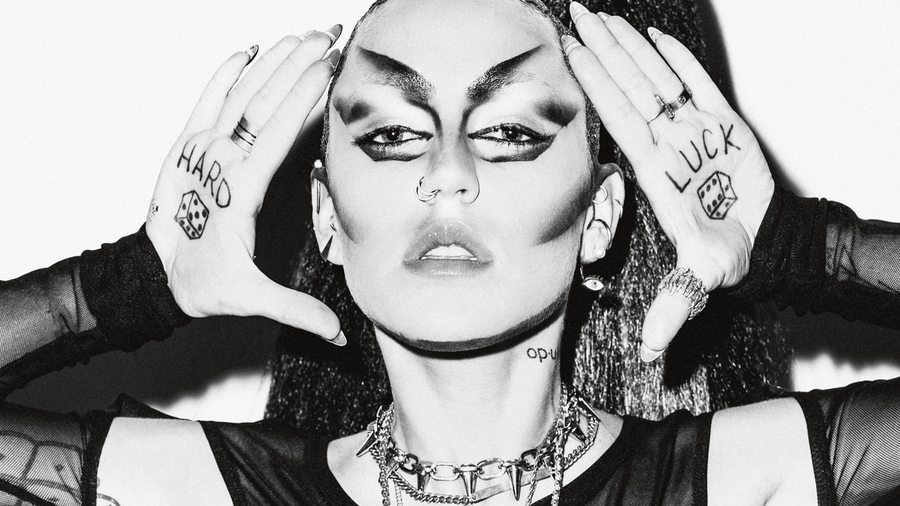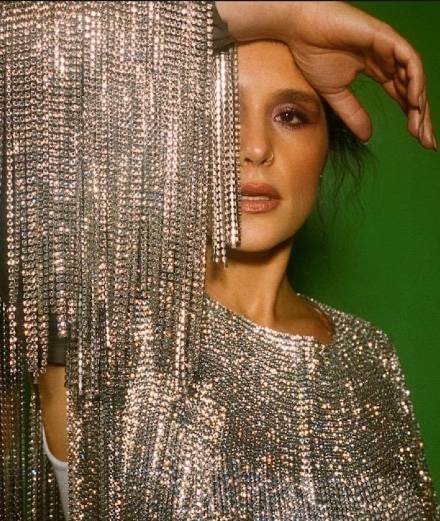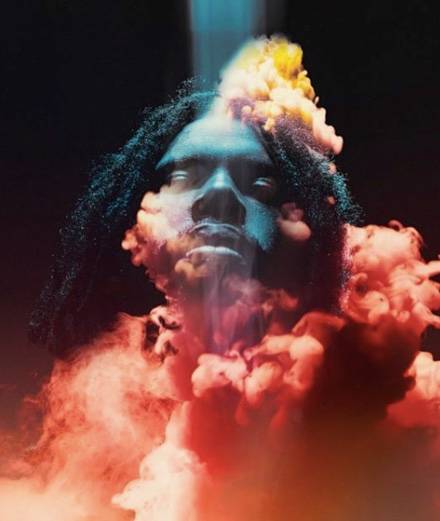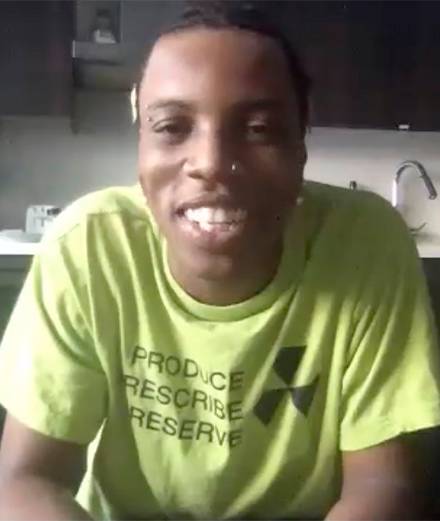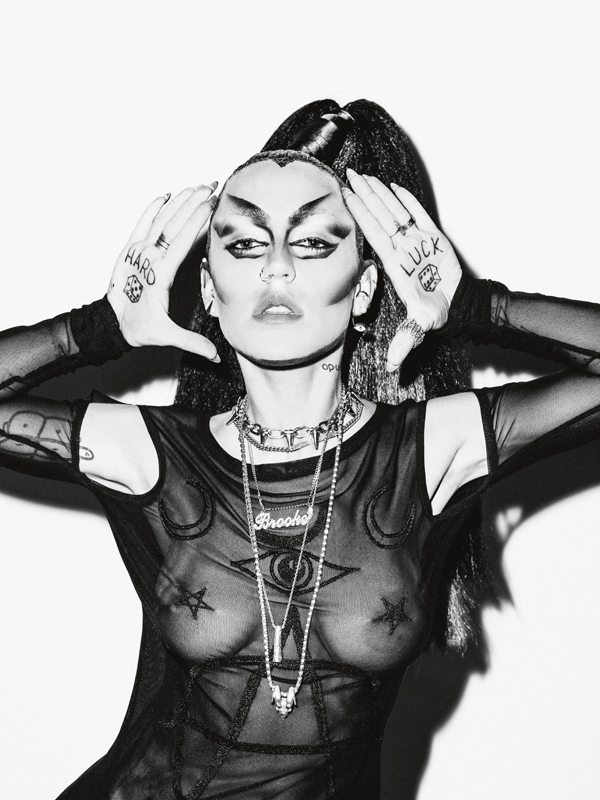

“Schizophrenic. Decadent. Opulent.” That’s how Brooke Candy describes her style. Three words which, when tripping off her tongue, sound like an incantation, thrown in the face of an interviewer already hypnotized by her snake-charming allure. Stripper, rapper, performer… this Californian is all these and more: she’s a witch, the kind they used to burn in Salem; a largerthan-life lady, dominating and scared of nothing, least of all herself; and then there’s something of La Saraghina from Fellini’s 8½ about her. Just like the film fans confronted with a shamelessly voluptuous Saraghina unbridled on an Italian beach, when faced with Brooke Candy viewers waiver between ardent lust and naïve fascination.
In her video Das Me, made for her first hit in 2012, Candy appears as a futuristic Amazon, hair in long pink plaits and dressed in golden armour straight out of the manga cartoon Knights of the Zodiac. For Candy is indeed a fighter. Too sexy? Anyone say vulgar? She chants a manifesto text: “It’s time to take the back, ‘Slut’ is now a compliment. A sexy-ass female who running shit and confident…” This is the new feminism, cheered on by the millions of YouTube viewers who have lapped up the video of Das Me, as well as the videos for the irresistible tracks I Wanna Fuck Right Now and Everybody Does.
“The freaks I met are all truly authentic beings, in touch with their deep inner selves, and I admire their ability to overcome the challenges society has thrown at them. Be yourself – that’s exactly the message I want to convey.”
Brooke Candy, “Das Me” music video.
This powerful woman, in part and above all, owes her success to an undeniable quality: her own story. Debauched without ever becoming totally sleazy, her life is already worthy of a chapter in James Frey’s novel L.A. Story. And she’s only 24 years old. “I was raised in the suburbs of Los Angeles. My father worked for Hustler magazine but that’s not to say I got an overly liberal upbringing… At 17 I realized I’d learned nothing about real life. I wanted to face it head on, so I quit my parent’s house.” Candy got herself an education with the freaks and drag queens she met in San Francisco and then Los Angeles where she went to live. She smokes. A lot. And not just tobacco. “I thank these people for having opened my eyes. The freaks I met are all truly authentic beings, in touch with their deep inner selves, and I admire their ability to overcome the challenges society has thrown at them. These people had to fight to become who they are. Be yourself – that’s exactly the message I want to convey.”
She has inevitably been compared to Lady Gaga, albeit in West Coast trash mode. And their messages are indeed similar. Candy calls her fans “my fags,” while Gaga calls hers “my little monsters.” But Candy’s words are cruder, and symptomatic of a movement that’s striving, in the manner of Pussy Riot, to renew the face of feminism. Insults that were fought against yesterday are now reclaimed with a vengeance, re-appropriated so as to neutralize them. “The feminism that I’m claiming isn’t like the one from the 1960s, I’ll give you that. The stakes are different now. In fact, if I’m a feminist, I’m above all a humanist. Maybe that’s what’s evolved in me since my first steps into the music industry. I like everyone these days.” This last reference is no doubt a riposte to the furore around her recent outpourings, repeated ad infinitum by the press, where she announced, “Every straight guy I’ve ever met is as filthy as a damn pig.” And she certainly knows what she’s talking about. In her past life as a stripper she was continuously confronted with the male sex, and she doesn’t hide her opinions. “Men look at me like an object, but really they’re the objects because I see them as wallets…”
“Being shocking isn’t a problem for me as long as I’m easy with it and it fits in with who I am. It allows me to bring attention to my ideas, encourage the public to ask questions and push the boundaries.”


Formed by these experiences, Candy’s edifying message was just waiting to go mainstream. “I’d never imagined myself having a music career,” she recalls. “I was living between my car and the strip club when a friend of mine told me about a producer looking for a white female rapper. I said to myself that I could do it and that it would be the perfect opportunity to share my message.” And, so as to reach the widest audience, she invented a music genre which she herself defines as “a mix of hip hop and pop, the two most popular genres around today.” Candy certainly knows her classics. During the interview she talks passionately about The Notorious B.I.G. and the Wu-Tang Clan and, of course, the girl rappers who made inroads into a deeply misogynist industry. Critics like comparing her to Lil’Kil, who she says she admires. And Candy has clearly understood who she needs in her entourage. She confirms she’s been working with star producers will.i.am (founder member of the Black Eyed Peas) and Benny Blanco (Katy Perry, Britney Spears) on her first album, currently in production. It’s a long ride from her cameo role in the young prodigy Grime’s video for her track Genesis to this new found status as hip-hop star. A status which seems to have forced this extrovert beauty to give up photography, which had been a contributing factor to her success on Tumblr. Candy recently signed up with RCA Records, a label she shares with the scandalous Miley Cyrus, who didn’t hesitate to mark the occasion by posting a photo of her and Candy snogging on Twitter. Shocking for shocking’s sake? “Being shocking,” she replies, “isn’t a problem for me as long as I’m easy with it and it fits in with who I am. And if being shocking allows me to bring attention to my ideas, encourage the public to ask questions and push the boundaries, then that suits me just fine.”
“The hip hop [LGBTQ+ people] are defending is no different to the work of straight rappers. It shouldn’t even be acceptable to talk about sub-genres, gay hip hop or queer hip hop. It’s not a sub-genre. It deserves to be treated like the any other.”
Brooke Candy, “Opulence” music video.
Accepting her physique, defending her freedom, understanding human nature in a more open way and accepting difference: Candy’s programme forms part of an agenda that’s been well defended by the American entertainment business with unexpected ardour over the last few years. From the openly bisexual Angel Haze to the delicious Mikky Blanco, who’s actually a man, the hip-hop industry no longer balks at gambling on less conventional personas who are neither homophobic nor misogynist. The media is close behind. As are the public. It’s reaching a point where talking about a “queer” scene is exasperating the artists themselves, who see it as reductive. A few months ago New Yorker Zebra Katz took offence to it in this very magazine. Candy totally agrees with his analysis. “Do you really think that a type of music can come from the sexual preferences of the person who writes it? I mean seriously? The people you’re talking about are incredible artists, their sound is sick. The hip hop they’re defending is no different to the work of straight rappers. It shouldn’t even be acceptable to talk about sub-genres, gay hip hop or queer hip hop. It’s not a sub-genre. It deserves to be treated like the any other.”
Brooke Candy… or when an ecumenical approach is built on a hybrid world caught between the underground and the mainstream, between hip hop that is perceived as misogynist and the queer rights’ movement, between a limitless fascination for sophisticated fashion and for a liberated and pornographic sexuality. Now independent again, she taps into punk tones to polish her anti-establishment attitude that sticks to her skin – no doubt, voluntarily – since her debut. War and My Sex, two new songs that have marked the return of the trashy diva in the distant lands from this easy commercial pop in which she ventured under the RCA Records era until 2017 (the year of her Living Out Loud, in collaboration with Australian pop star Sia). Brooke Candy is what? 2018, that’s what.


